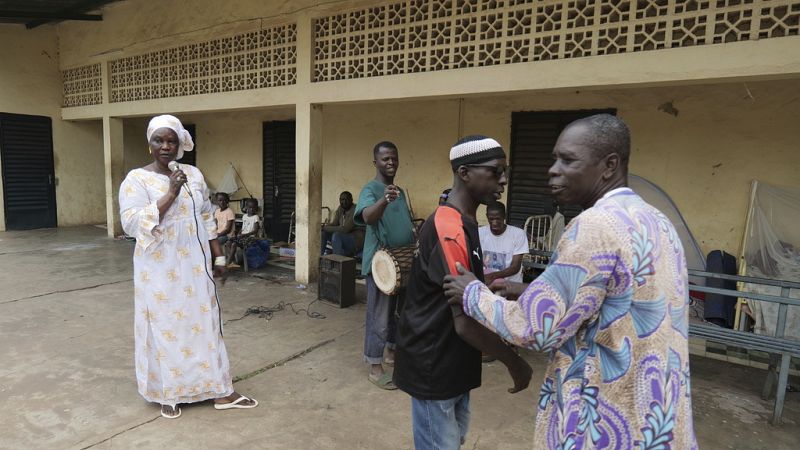Mental health patients in Mali find their voice through theater

In the courtyard of the psychiatric ward in one of Bamako’s main hospitals, a small group of patients dance to the beat of a a djembe, a traditional West African drum.
The group then act out scenes of a village dispute.
A young patient, Mamadou Diarra, cries out to another in Bambara: “Hee hee ha ha ha ha! you don’t know anything! You don’t know anything. Just nonsense!”
Both break into smiles, and Diarra dances as he continues launching insults at his fellow performer.
The group is taking part in Koteba, a traditional form of theater practiced by Mali's largest ethnic group, the Bambara.
It mixes acting, singing and dancing and is usually performed in villages as an outlet to work through problems and an open space for satire.
But here at Point G, one of the largest hospitals in Bamako, Koteba is also a way of offering support and a sense of community to people receiving psychiatric care.
A troupe of actors brought Koteba to the Point G psychiatric ward in 1983, and patients and actors alike have been meeting every Friday since.
Diarra is the star of the show, and other patients gather around him.
“I’ve never done any kind of theater before. I’ve never danced. But once I started, God gave me the knowledge of these things,” he says.
“You know what my problem is? That I see things for what they are,” Diarra adds.
Adama Bagayoko, head of the theater troupe, responds “Okay, we’ll lighten that load for you.”
Mali has fewer than 50 mental health professionals for a population of more than 20 million, according to a 2022 report by the World Health Organization.
People with mental illnesses are often left without treatment and excluded from society.
Bagayoko, who's 67, was one of the original actors who brought Koteba to Point G, as mental health workers looked for a way to use Mali’s cultural practices to help people receiving psychiatric care.
Bagayoko says Koteba is important because it gives patients here the right to speak.
"When they come here and see through the Koteba that they aren’t excluded because we give them the floor. We touch each other, we talk to each other, we dance together, we laugh together. This is the importance of Koteba. To touch someone shows that we are equal. To listen to them shows that they are important, and what they say is important," he explains.
The Koteba performances at Point G unfold in three phases.
First, the troupe plays music to invite patients into the courtyard. Then the troupe asks what the topic or theme of that day's performance should be.
After the performance, they sit in a circle and give the floor to any patients who wish to speak.
Souleymane Coulibaly, a clinical psychologist at the Point G hospital, says Koteba is a tradition that is uniquely positioned to help people in the psychiatric ward to work through their problems.
“Koteba is a traditional technique that was developed in the Bambara culture to address social problems, which are often dramatic, with the goal of de-dramatizing them,” he says.
Because the patients feel at ease, they often tell the actors details about their lives they are not comfortable sharing with their family or doctors.
In the courtyard, patients act out a familiar scene in Mali, where petty disputes are solved in the community: a man in a village is accused of stealing. As the villagers gather around him in anger, he escapes and flees the village.
The hospital at Point G is only a short walk from Mali’s political stage — the presidential palace and main military base — where a 2020 military coup has left the country struggling with increased extremist violence and economic hardship.
But those problems are far away during the Koteba performances at the hospital, as Diarra and his fellow patients are immersed in the world they create.
Yesterday

